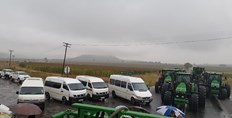Agri Hour
Women empowerment central to government policies - Didiza─── 12:00 Mon, 07 Sep 2020

Agriculture minister Thoko Didiza says women's empowerment will be central to government's policies, regulatory reform, and programmatic intervention, and important milestones have been reached by the department in that regard.
There are, however, still challenges facing women which includes among others mechanisation.
Addressing a recent webinar on Women in Agriculture, Didiza noted that when assuming office as the Head of State, President Cyril Ramaphosa highlighted the sectors that will be prioritised in order to rebuild the economy.
Amongst these was the importance of agriculture and the agribusiness sector.
"He further announced that the government would rapidly release agricultural state land as its contributions in dealing with the vexing problem of land inequity as a result of colonial and apartheid policies and laws," Didiza said.
She further stated that the department has made progress regarding the following:
1. Develop a land beneficiary selection policy to guide land allocation
2. Produce a support model
3. Agriculture and agribusiness master plan
4. Poultry and sugar master plan
5. Developing a plan for land release
"These are important milestones in terms of the work that has been done thus far," she continued while explaining that when engaging women in the sector, the following issues emerged:
1. Access to land. Women in the various subsectors of agriculture have raised the challenges in accessing land either for leasing, acquisition, or state land. This relates to prices that make it impossible to access. Applications take long on government lease programmes. The allocation is perceived to favour male farmers. The government, through its programmes, has not strategically targeted land according to commodities for acquisition in order to be deliberate on improving the participation of women in these sectors.
2. Financial services, with grants and loans. While women appreciate the support that the government is giving through ilima/letsema and comprehensive agricultural programmes, these do not take into multiyear support that will enable financial viability.
3. Specific support programmes, taking into consideration challenges in the sector such as marketing and trade requirements.
4. Mechanisation and other implements remain a challenge. The agriparks that the government implemented to deal with this, remain a challenge.
5. Lack of statistical data of how many women are in the sector and in what commodities, remains one of our bigger challenges.
6. Research and technology access remain a problem.
7. Extension and advisory services are far and in between.
"Having identified these challenges, what do we need to do? Answering this question requires government, government entities, the private sector and women producers, and agri entrepreneurs," Didiza emphasised.
She further lined out the government's plans, including the following:
1. Release state land with 50 percent being for women
2. Training for beneficiaries
3. Effective land reform through supporting those who had received the land
4. Develop a targeted programme for women farmers and entrepreneurs in the space
5. 40 percent procurement for women businesses
Mobilisation and organisation
1. Develop a database of women organisations engaged in agriculture as well as agribusiness
2. Round table quarterly with the minister with women producers in order to look at how we can unblock challenges.
Listen to the podcast below:
Women empowerment central to government policies - Didiza:













